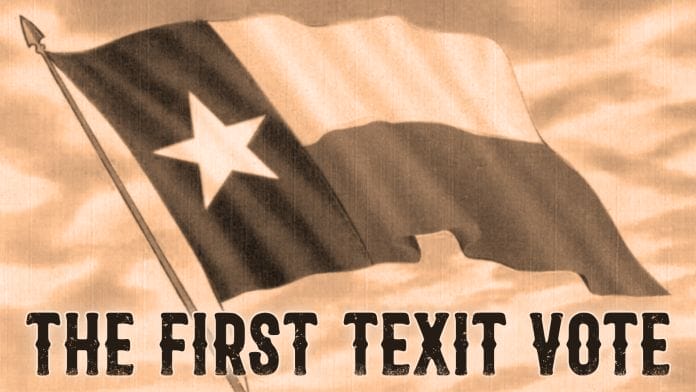Texas once voted for independence – Many Texans wanted to revert to an independent state in 1861. Some people cried foul. Some said the vote was rigged, others said that it was stolen. The electorate was polarized and angry. A description of the most recent midterms? The last Presidential election? No. It is a historical snapshot of a Texit referendum you may never have heard about.
In 1861, the majority of Texan voters were in favor of leaving the Union. The vote count was disputed and some claimed it was rigged. There was as little evidence then as there is in present-day US elections. The archives give slightly differing numbers but the outcome was never in doubt. The best estimates are all between 75 to 77 percent in favor of departing from the Union.
Texans like to claim that they are pioneers, and in one regard they are. The state referenda on secession were the first ever popular votes on independence in US history. Certainly, there were other referendums throughout the world at the time. Voters in various parts of Italy had voted for establishing a unified Kingdom; their ally Napoleon III of France (the nephew of the more famous Bonaparte) made support for the Italians conditional upon a referendum. The French Emperor also requested the city of Nizza (present-day Nice) be allowed to vote on whether it should be French or Italian in 1860- they obviously voted for France.
At the time referendums were used to settle territorial issues. The referendum was a peaceful means of resolving issues of nationality. We can learn from this.
When people were voting on independence in Scotland, or in the Brexit referendum in the United Kingdom, the precedent for these votes was in the Lone Star State.
We tend to forget that the past rhymes with the present. At “a time when Secession movements gain traction in US,” and at a time when the Texas State Republican Convention has adopted a platform urging the Legislature to provide a Texit referendum in 2023, it is interesting to look at the last referendum held.
Historians, insofar as they have written about this referendum at all, have tended to think of it as just another reactionary vote for joining the slave-supporting Confederacy. Certainly, in my research, I have found these sentiments in Virginia, Tennessee, and Arkansas where referendums were held at the same time.
But contemporary sources show that Texas was different, and for a reason. The Republic of Texas had only joined the Union in 1845 – having declared independence from Mexico after the war in 1836.
For this reason, the debate surrounding the referendum on February 23rd reportedly focused on the rebirth of a nation, not subsuming a territory into the confederacy. One contemporary report in The Texas Almanac 1862 read, “The Lone Star flag, the former emblem of our independence as a republic, was generally used all over the state as evidence of a universal desire to resume our state sovereignty.”
An eyewitness went on, “There were numbers in various parts of the state embracing many of the early settlers, who took active measures to organize what was called Lone Star Associations, advocating the reestablishment of the Republic of Texas in opposition to annexation to the Southern Confederacy.” Yet, after the vote, these hopes were dashed. Governor Sam Houston – who had fought to establish the independence of the Republic of Texas – refused to swear allegiance to the Confederacy. As he said, “Fellow-Citizens, in the name of your rights and liberties, which I believe have been trampled upon, I refuse to take this oath. In the name of the nationality of Texas, which has been betrayed by the Convention, I refuse to take this oath.”
He was deposed. And Texas citizens, notwithstanding the apparent support for becoming independent again, also did not get what they wanted. The voters of Texas who wanted independence were arguably betrayed by politicians. Maybe the same will happen again, or maybe we learn from our mistakes. For, as a great philosopher said, history repeats itself. The first time in haste, the second with the benefit of lessons learned from the past.
Professor Matt Qvortrup’s book I Want to Break Free: A Practical Guide to Making a New Country is published by Manchester University Press. He is a world-renowned political scientist and a professor of political science at Coventry University. He is considered the leading expert on referendums in the world.

